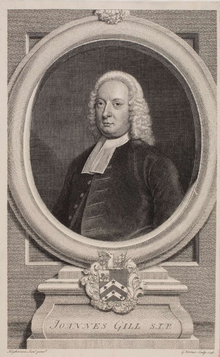John Gill (theologian)

John Gill (23 November 1697 – 14 October 1771) was an
Early life and education
| Part of a series on |
| Baptists |
|---|
 |
|
|
At the age of about 12, Gill heard a sermon from his pastor, William Wallis, on the text, "And the LORD God called unto Adam, and said unto him, Where art thou?" (Genesis 3:9). The message stayed with Gill and eventually led to his conversion. It was not until seven years later that he made a public profession of faith.[1]
Pastoral work
His first pastoral work was as an intern assisting John Davis at
During Gill's ministry, the church strongly supported the preaching of George Whitefield at nearby Kennington Common.
Various works
In 1748, Gill was awarded the honorary degree of Doctor of Divinity by the University of Aberdeen. He was a profound scholar and a prolific author. His most important works are:
- The Doctrine of the Trinity Stated and Vindicated (London, 1731)
- The Cause of God and Truth Archived 24 February 2005 at the Wayback Machine (4 parts, 1735–38), a retort to Daniel Whitby's Five Points
- An Exposition of the New Testament (3 vols., 1746–48), which with his Exposition of the Old Testament (6 vols., 1748–63) forms his magnum opus
- A Collection of Sermons and Tracts
- A Dissertation Concerning the Antiquity of the Hebrew Language, Letters, Vowel-Points, and Accents (1767)[2]
- A Body of Doctrinal Divinity (1767)
- A Body of Practical Divinity (1770).
Gill also edited and re-published the works of the 'antinomian' theologian Tobias Crisp. He wrote a preface to the Hymns of Richard Davis and edited John Skepp’s book titled 'Divine Energy'. He signed the prefatory “epistle to the reader” of Herman Witsius' 'Oeconomy of the Covenants' together with John Brine.[3]
Significance
John Gill was the first major writing Baptist theologian, his work retaining influence into the 21st century. Gill's relationship with
See also
- Hyper-Calvinism
- Primitive Baptist
References
- ^ G3 Ministry - Read More Gill. Retrieved July 7, 2022. Archived 6 April 2022 at the Wayback Machine
- ^ Gill, John (16 January 1778). "A Collection of Sermons and Tracts ...: To which are Prefixed, Memoirs of the Life, Writing, and Character of the Author". G. Keith – via Google Books.
- ^ Toon, Peter (2003). The Emergence of Hyper-Calvinism in English Nonconformity, 1689-1765. Quinta Press. pp. 96–97.
- ^ Nettles 1986.
- ^ George 1990.
- ^ Ella 2009.
Sources
- Daniel, Curt. Hyper-Calvinism and John Gill. Unpublished Ph.D. dissertation, University of Edinburgh, 1983.
- Ella, George (1995). John Gill and the Cause of God and Truth. Eggleston, England: Go-Publications.
- Ella, George M. (17 August 2009). "John Gill and the Charge of Hyper-Calvinism". Biographia Evangelica. Archived from the original on 3 December 2019. Retrieved 27 July 2017. First published by Baptist Quarterly, October, 1995.
- George, Timothy (1990). "John Gill". In George, T.; Dockery, D.S. (eds.). Baptist Theologians. Broadman Press. p. 77ff. ISBN 978-0-8054-6588-4.
- Murray, Iain H. Spurgeon v. Hyper-Calvinism: The Battle for Gospel Preaching. Banner of Truth, 2000. ISBN 0-85151-692-0
- Nettles, Thomas J. (1986). By His Grace and for His Glory: A Historical, Theological, and Practical Study of the Doctrines of Grace in Baptist Life. Grand Rapids, MI: Baker Books. ISBN 978-0-8010-6742-6.
- Oliver, Robert W. History of the English Calvinistic Baptists: 1771–1892. Banner of Truth, 2006. ISBN 0-85151-920-2
- Peter Toon, The Emergence of Hyper-Calvinism in English Nonconformity, 1689-1765. London: The Olive Tree, 1967.
- Rippon, John (1838). Brief Memoir of the Life and Writings of the Reverend John Gill. Reprint: Hess Publications, 1998. ISBN 0-87377-920-7
![]() This article incorporates text from a publication now in the
This article incorporates text from a publication now in the
External links
- The Cause of God and Truth by John Gill (1738)
- The Emergence of Hyper-Calvinism in English Nonconformity, 1689–1765 by Peter Toon.
- The Emergence of Hyper-Calvinism in English Nonconformity, 1689–1765 by Peter Toon (1967)
- John Gill's Exposition of the Old and New Testaments—his magnum opus
- The John Gill Archive—containing most of Gill's published works, including many sermons and tracts, The Cause of God and Truth, A Body of Doctrinal Divinity, and A Body of Practical Divinity, and Solomon's Song.
- Christ alone exalted, in the perfection and encouragement of the saints, notwithstanding sins and trials : being the complete works of Tobias Crisp ... containing fifty-two sermons, on several select texts of Scripture ... Volume 1 of 2. (1832, 7th ed.) John Gill edition. Downloadable PDF which may be read online.
- Christ alone exalted, in the perfection and encouragement of the saints, notwithstanding sins and trials : being the complete works of Tobias Crisp ... containing fifty-two sermons, on several select texts of Scripture ... Volume 2 of 2. (1832, 7th ed.) John Gill edition. Downloadable PDF which may be read online.
